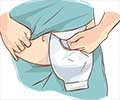Q: Which doctor treats kidney stones?
A: Kidney stones are treated by a urologist.
Q: Can drugs promote the formation of kidney stones?
A: Drugs like acyclovir, indinavir and triamterene can result in stone formation.
Q: What are the dietary recommendations for kidney stones?
A: It is important to maintain adequate fluid intake so that the urinary output is at least 2 to 3 liters per day. Excess fluid reduces the concentration of stone-forming crystals in the urinary tract and helps to flush out crystals and small stones. Oxalate-containing foods like spinach and soya bean should be avoided by patients prone to calcium oxalate stones. The dietary calcium intake however should not be restricted. In fact, calcium in the diet binds to oxalates from food in the intestines and prevents its absorption, thereby reducing the chances of calcium oxalate stones developing in the kidneys. At the same time, calcium supplements should be avoided because the excess calcium will be excreted in the urine and combine with oxalates in the urine to form calcium oxalate stones. Vitamin D should be avoided unless you suffer from a deficiency since vitamin D increases the absorption of calcium and thereby its urinary excretion. Non-vegetarian food should be limited in patients suffering from uric acid stones. You can find more information in the link below:
http://www.medindia.net/patients/patientinfo/diet-kidney-stones.htm
Q: How long should I take the Potassium citrate tablets or solution to prevent stones?
A: These should be recommended as life-long measure to be effective. Once a person has formed a stone, their risk of 2nd stone is almost 50%.
Q: Does Vitamin C supplement cause stone formation?
A: This has been the belief previously as vitamin C get metabolized to oxalate but in most studies, intake of vitamin C has not shown to increase the risk of stone formation.
Q: Are fruit juices helpful in preventing kidney stones?
A: Lemon juice or lemonade increases the level of citrate in the urine and therefore may prevent the development of calcium oxalate stones. Other juices like orange juice, apple juice, cranberry juice and grapefruit juice could increase the risk of calcium oxalate stones and are therefore not advised in individuals prone to these stones. Soft drinks could increase the risk of phosphate stones since they contain phosphorus.
Q: Are there herbal preparations to prevent stone formation?
A: Many home remedies for kidney stones have been recommended but no scientific study is available to substantiate the claim.
Q: Do all kidney stones require hospitalization?
A: Several kidney stones, especially in uncomplicated cases where the stone has a high chance of expulsion and the discomfort is bearable, can be initially treated on an outpatient basis. The presence of a single kidney, fever, persistent pain, severe nausea and vomiting are some situations that require hospitalization.
Q: Which are the surgical treatments used to treat kidney stones?
A: Surgical/non-medical treatments used to treat kidney stones include the following:
- Stent placement, where a small tube is inserted into the ureter so that it remains open and the stone can drain out
- Percutaneous nephrolithotomy or nephrolithotripsy, where large stones are removed or broken down with the help of an instrument called a nephroscope inserted through a small cut in the back
- Extracorporeal shockwave lithotripsy (ESWL), where shock waves are applied externally to break the stone. The smaller pieces pass through the urine more easily
- Ureteroscopy (URS), where an instrument is inserted into the ureter and the stone is broken down with the help of laser
- Open surgery may be required in rare cases








